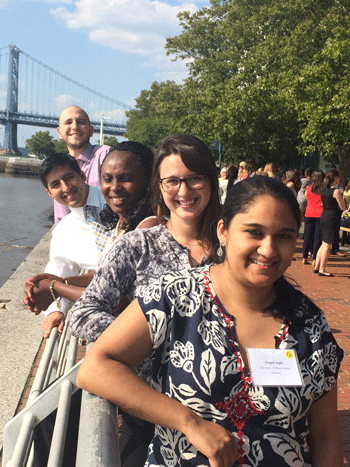 |
|
|
Pictured front to back are students Trupti Ingle, Allison Earon, Beriline Akwe, Eric Romo and Benjamin Alfred. Not pictured is pharmacy resident Ayumi Tran. |
A team of students from UMass Medical School will have a hands-on opportunity to help shape changes in health care. UMMS has been selected to participate in a new initiative that aims to improve care for patients who are heavy utilizers of emergency room and hospital services.
The Interprofessional Student Hotspotting Mini-Grant Project provides students from various health professions the opportunity to work as teams to coordinate care using the “hotspotting” model. It is led by the Association of American Medical Colleges, the Camden Coalition of Healthcare Providers and Primary Care Progress.
Hotspotting in health care was developed by Jeffrey Brenner, MD, CEO, of the Camden Coalition, who was inspired by the policing model from New York City that focused resources on heavier crime areas called “hot spots.” In the health care model, primary care physicians identify patients who are “super utilizers” and focus resources on understanding their health care needs and their home environment in the hopes of helping them better manage their own care and keeping them out of the hospital.
UMMS is one of 10 schools added to the project in its second year, joining 10 schools that participated in the first year.
“It’s thrilling to be a part of this initiative because it aligns perfectly with our school and clinical mission areas,” said Melissa Fischer, MD, MEd, associate professor of medicine and associate dean for undergraduate medical education in the School of Medicine. Those mission areas include a commitment to advancing primary care, serving underserved and at-risk populations, and community engagement.
The UMMS project, Central Mass Partners in Prevention, has an interprofessional team of six students: Allison Earon and Trupti Ingle are second-year students in the School of Medicine; Ben Alfred, RN, is a student in the Graduate School of Nursing’s DNP program; Eric Romo is a student in the Clinical and Population Health Program in the Graduate School of Biomedical Sciences; Beriline Akwe is a student in the School of Public Health at UMass Lowell; and Ayumi Tran is a pharmacy resident at UMass Memorial. Advisors to the team include Janet Hale, PhD, professor and associate dean of nursing; Tracy Kedian, MD, associate professor of family medicine & community health; and Michelle Sheerin, LICSW, case manager at UMass Memorial Health Care.
The team will identify representative super utilizers from adult and pediatric populations using data from the Office of Clinical Integration and the Department of Quantitative Health Sciences. Ultimately two patients from each population will be selected to participate in the interprofessional initiative.
According to Dr. Kedian, all of the students chosen to participate were familiar with hotspotting and the Camden Coalition prior to UMMS receiving the grant, so were eager to be involved, and they have complimentary skill sets. As an interprofessional team, they will be able to contribute to the spectrum of care that these complicated patients need, from understanding their medication history and interactions to seeing what factors in the home and community may be contributing to their inability to effectively manage their health. The students will also have an interprofessional advisory council to call on for guidance in navigating the complex environment of health care and research.
The team will work with these patients to identify the underlying causes of overutilization. By visiting the patients at home and accompanying them on hospital and outpatient visits, the students hope to understand the personal circumstances that lead to the patients’ complex health problems and consider what types of community-based services and interventions might serve to break the cycle of repeated emergency room visits and hospitalizations.
For the students, the six-month learning collaborative includes monthly webinars and case conferences, as well as a kick-off meeting in Camden, N.J. The grant, which is matched by the school and clinical system, covers the cost of travel for the students as well as some operational needs.
The overarching goal for UMMS is to build a sustainable model of hotspotting that can be implemented at both the educational and clinical level that leads to better care for individual patients and improvements in health care delivery. Another important goal for students is to highlight the value of working in Interprofessional teams and to bring hotspotting and interprofessional learning into the curriculum where future students will continue the same work.
“Super utilizers are the hardest to care for and cost the most money. And our health care system does a spectacularly bad job with them,” said Kedian, who is herself a primary care physician at the Family Health Center of Worcester. “Chronic illness needs to be managed in the home and in the community and the only solution is interprofessional care.”